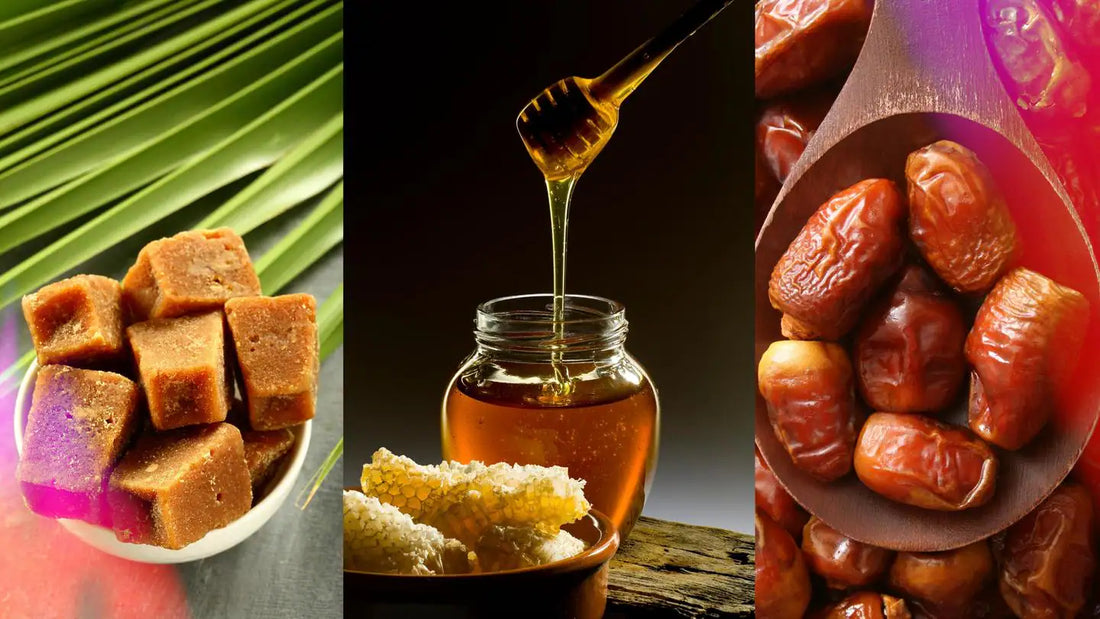Honey, a natural sweetener produced by bees, is often hailed as a healthier alternative to sugar, dates, jaggery, and stevia. Here’s a quick look at why honey stands out:
1. Nutritional Content
- Honey: Packed with vitamins, minerals, antioxidants, and amino acids, honey provides more than just sweetness. It contains trace amounts of vitamins B and C, calcium, iron, magnesium, and potassium.
- Sugar: Pure sugar is devoid of any nutrients, offering empty calories that can lead to weight gain and other health issues.
- Dates: While dates are nutrient-rich, they are high in calories and can spike blood sugar levels if consumed in large amounts.
- Jaggery: Though jaggery contains some minerals and vitamins, it is still high in calories and may not be as nutrient-dense as honey.
- Stevia: A zero-calorie sweetener derived from the leaves of the Stevia plant. It contains no vitamins or minerals but is a popular natural alternative to artificial sweeteners.
2. Glycemic Index (GI)
- Honey: Honey has a moderate glycemic index (GI) of around 58, meaning it raises blood sugar levels more slowly. This helps maintain steady energy levels and prevents the rapid spikes and crashes associated with high-GI foods.
- Sugar: Sugar has a high GI of around 65, leading to quick spikes in blood sugar levels followed by rapid declines.
- Dates: Dates have a moderate to high GI of around 42-55, which can still lead to significant blood sugar fluctuations.
- Jaggery: Jaggery has a high GI, similar to sugar, at around 84, causing quick increases in blood sugar levels.
- Stevia: Stevia has a GI of 0, meaning it does not affect blood sugar levels at all, making it an excellent option for diabetics and those looking to control blood sugar.
3. Antioxidant Properties
- Honey: Rich in antioxidants like phenolic acids and flavonoids, honey helps combat oxidative stress and inflammation in the body.
- Sugar: Sugar lacks antioxidants and contributes to inflammation and oxidative stress.
- Dates: Dates contain antioxidants, but the caloric content and sugar levels are considerably higher.
- Jaggery: Jaggery offers some antioxidants but not as many as honey.
- Stevia: Stevia has some antioxidant properties, but its main benefit is being a calorie-free sweetener.
4. Digestive Benefits
- Honey: Honey contains enzymes that aid in digestion and has prebiotic properties, promoting healthy gut bacteria.
- Sugar: Sugar can disrupt gut bacteria and lead to digestive issues.
- Dates: Dates contain fiber, which is good for digestion, but their high sugar content can negate some benefits.
- Jaggery: Jaggery can aid digestion but is not as effective as honey in promoting gut health.
- Stevia: Stevia has no known digestive benefits but is a good alternative for those needing to avoid sugar.
Conclusion
Based on glycemic index, nutritional content, antioxidant properties, and digestive benefits, here’s a ranking of these sweeteners from best to least favorable:
- Honey: Best overall due to moderate GI, rich nutritional profile, and health benefits.
- Stevia: Excellent for low GI and zero calories, ideal for diabetics.
- Dates: Good for nutrients and moderate GI but high in calories.
- Jaggery: Contains some nutrients and antioxidants but has a high GI.
- Sugar: Least favorable due to high GI and lack of nutrients.

